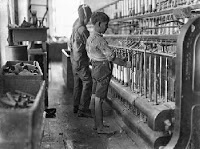Social Sciences



Industrial Revolution that took place first in England during 18th century brought about sweeping changes throughout Europe. Never before in history did social changes take place on such a massive scale. Sociology emerged in the context of the sweeping changes.
Factory system of production and the consequent mechanisation and industrialisation brought turmoils in society. New industries and technologies change the face of the social and physical environment. The simple rural life and small-scale home industries were replaced by complex urban life and mass production of goods. Industrialisation changed the direction of civilisation. It destroyed, or radically altered, the medieval customs, beliefs and ideals.
Industrialisation and led to urbanisation. Peasants left rural areas and flocked to the towns, where they worked as industrial labourers under dangerous conditions. Cities grew at an unprecedented rate providing an anonymous environment for people. Social problems became rampant in the fast developing cities. Aristocrats and monarchies crumbled and fell. Religion began to lose its force as a sours of moral authority. "For the first time in history, rapid social change became the normal rather than abnormal state of affairs, and people could no longer expect that their children would live much the same lives as they had done. The direction of social change was unclear, and the stability of the social order seemed threatened. An understanding of what was happening was urgently needed' [Robertson's' "Sociology" Page: 11]
Its clear from the above that sociology was born out of the attempt to understand the transformations of that seemed to threaten the stability of European society. Social thinkers like Comte, Spencer and others argued that there was an urgent need to establish a separate science of society. They believed that such a science would be of great help in understanding the nature and problems of society and find out solutions for the same.
- Importance Of Rural Sociology
The practical value of the study of rural sociology is widely recognised today. As long as the villages and the rural society assume importance, the rural sociology shall continue to acquire importance. The value of rural sociology can be understood by...
- Scope Or Subject-matter Of Rural Sociology
The scope or subject-matter of rural sociology is basically the study of rural society with all its complexities. According to Lawry and Nelson, 'The subject-matter of rural sociology is the description and analysis of the progress of various groups...
- Introduction Of Rural Sociology
Rural Sociology is a specialised field of sociology. As the name indicates, it deals with the society of village or rural society. It is a systematic and scientific study of rural society. The majority of the people on the earth live in villages and...
- The Industrial Revolution
he Industrial Revolution began in England in the eighteneeth century and quickly spread across Europe and North America. New technology and inventions transformed an agricultural and commercial way of life into a modern industrial society. Changes brought...
- Factors Contributing To The Emergence Of Society
Sociology came to be established as an independent and a separate social science in the middle of the 19th century. Various factors paved the way for its emergence. Ian Robertson in his book "sociology" [pages: 11-12] has mentioned of three factors that...
Social Sciences
Industrial Revolution and Industrialisation



Industrial Revolution that took place first in England during 18th century brought about sweeping changes throughout Europe. Never before in history did social changes take place on such a massive scale. Sociology emerged in the context of the sweeping changes.
Factory system of production and the consequent mechanisation and industrialisation brought turmoils in society. New industries and technologies change the face of the social and physical environment. The simple rural life and small-scale home industries were replaced by complex urban life and mass production of goods. Industrialisation changed the direction of civilisation. It destroyed, or radically altered, the medieval customs, beliefs and ideals.
Industrialisation and led to urbanisation. Peasants left rural areas and flocked to the towns, where they worked as industrial labourers under dangerous conditions. Cities grew at an unprecedented rate providing an anonymous environment for people. Social problems became rampant in the fast developing cities. Aristocrats and monarchies crumbled and fell. Religion began to lose its force as a sours of moral authority. "For the first time in history, rapid social change became the normal rather than abnormal state of affairs, and people could no longer expect that their children would live much the same lives as they had done. The direction of social change was unclear, and the stability of the social order seemed threatened. An understanding of what was happening was urgently needed' [Robertson's' "Sociology" Page: 11]
Its clear from the above that sociology was born out of the attempt to understand the transformations of that seemed to threaten the stability of European society. Social thinkers like Comte, Spencer and others argued that there was an urgent need to establish a separate science of society. They believed that such a science would be of great help in understanding the nature and problems of society and find out solutions for the same.
- Importance Of Rural Sociology
The practical value of the study of rural sociology is widely recognised today. As long as the villages and the rural society assume importance, the rural sociology shall continue to acquire importance. The value of rural sociology can be understood by...
- Scope Or Subject-matter Of Rural Sociology
The scope or subject-matter of rural sociology is basically the study of rural society with all its complexities. According to Lawry and Nelson, 'The subject-matter of rural sociology is the description and analysis of the progress of various groups...
- Introduction Of Rural Sociology
Rural Sociology is a specialised field of sociology. As the name indicates, it deals with the society of village or rural society. It is a systematic and scientific study of rural society. The majority of the people on the earth live in villages and...
- The Industrial Revolution
he Industrial Revolution began in England in the eighteneeth century and quickly spread across Europe and North America. New technology and inventions transformed an agricultural and commercial way of life into a modern industrial society. Changes brought...
- Factors Contributing To The Emergence Of Society
Sociology came to be established as an independent and a separate social science in the middle of the 19th century. Various factors paved the way for its emergence. Ian Robertson in his book "sociology" [pages: 11-12] has mentioned of three factors that...
